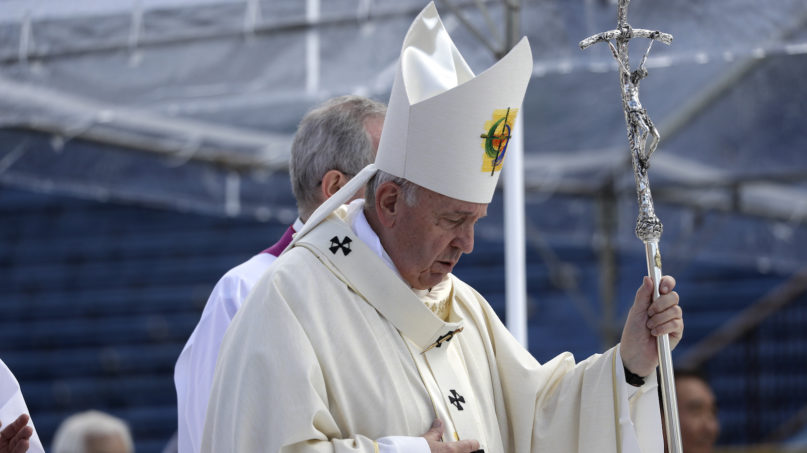TOKYO (RNS) – On his first day in Japan, Pope Francis hit the ground running during a meeting with local bishops, where he appealed to the country’s Catholic history as an “antidote against despair” in a society faced with high youth suicide rates and an aging population.
“All of us are aware of the grave problems affecting people in your communities whose lives are marked, for various reasons, by loneliness, despair and isolation,” Francis said in a speech to the Japanese episcopacy at the Apostolic Nunciature in Tokyo Saturday (Nov. 23).
The pope pointed to the “increase in the rates of suicide” and “bullying” as responsible for “new forms of alienation and spiritual disorientation.”
Francis is visiting Japan on the second leg of his Nov. 20-26 apostolic visit to Asia, which previously led him to Thailand. Both countries have a very small Catholic community, only 0.5% in Thailand and 0.3% in Japan.
In his speech, the pope said that he has felt “felt a fondness and affection” for Japan since he was young, when he dreamed of becoming a missionary priest. Today, Francis continued, he comes to the country “as a missionary pilgrim” and to support the small local church in raising its voice “when addressing pressing issues of peace and justice in our world.”
Among the issues facing Japan is the alarming suicide rate, which is so great that it has become a matter of public debate in the country. Starting in the late 1990’s, Japan saw a steep rise in suicide deaths. During its peak in 2003, about 70 people committed suicide every day.
Suicide cases have been steadily declining in the past three to nine years, but certain pockets of the Japanese population remain at risk. More than 300 children, from elementary to high school, committed suicide in 2018, according to research by the Japanese Ministry of Education, Culture, Sports, Science and Technology. Suicide rates have grown 42 percent every year, the same research showed, with the problem plaguing high schoolers most.
The most common causes of suicide, government data shows, tend to be depression, the pressure of family and work life and bullying, but in many cases the factors that lead to suicide remain unknown, challenging doctors and researches looking for solutions.
Francis urged the country’s bishops to cater to young people in particular since they are the most prone to commit suicide and “thirsting for compassion.”
“Try to create spaces in which the culture of efficiency, performance and success can become open to a culture of generosity and selfless love, capable of offering to everyone — not only to those who have ‘made it’ — the possibility of a happy and successful life,” he said.
With their zeal, ideas and energy, young people – when well-formed and accompanied – can be a deep source of hope to their contemporaries and bear vital witness to Christian charity.”
The pope also extended prayers to the victims and survivors of the typhoon that devastated Japan recently, stating that “evil has no preferences, it doesn’t care about people’s background and identities.”
Environmental disasters also have an effect on Japan’s suicide rate. A recent article by the Financial Times showed that employees not working for essential services were forced to go to work after the typhoon, regardless of safety and traffic conditions that paralyzed the city.
Many workers who don’t fall victim to karoshi, or death by overwork, contribute to the growing suicide rates, according to a Japanese government white paper calling for action on the issue released Oct. 1. In a country in demographic decline, concern about suicide and work-related deaths, especially among young people, have grown of late.
In fewer 30 years, Japan’s population may shrink from 127 million to 100 million, according to the National Institute of Population and Social Security Research. One third of the population is forecast to be elderly by 2036 and many Japanese are so overworked they say they are too busy to find a partner.
The Japanese’ emphasis on working long hours has also made it difficult for Catholic missionaries to make headway.
“People don’t have time to come to church. Here, work gets the priority, not religion,” said the Rev. Bradly Rozairo, a missionary priest in japan of the Delegation Superior of the Oblates of Mary Immaculate, in an interview with Vatican News on Tuesday (Nov. 19).
The Catholic Church in Japan has made efforts to speak out on the culture of overwork, and local dioceses offer call centers and meeting points for people who are thinking about committing suicide or are feeling lonely.
“The DNA of your communities is marked by this witness, an antidote against despair, that points out the path they must follow,” Francis told the bishops. “The mission in these lands was marked by a powerful search for inculturation and dialogue, which allowed for the creation of new models, independent of those developed in Europe.”
Even though the local church is very small, he said, its commitment to evangelization must not diminish and instead should focus on opening a “humble, daily witness and openness to dialogue” with the majority religions, Shintoism and Buddhism.
Pope Francis will visit Hiroshima and Nagasaki on Sunday (Nov. 24), where the United States dropped two nuclear bombs at the end of the Second World War causing almost 200,000 casualties, most of them civilian.
The motto of the trip, “Protect all life,” will gain even more significance that day when the pope is expected to make a compelling statement for nuclear disarmament.





